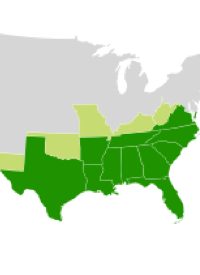
Earlier in the month a headline on the Rasmussen Report website reported that “21% say states have right to secede.” That figure was derived from the results of a survey of 1,000 adults conducted on May 30-31, 2011 by Rasmussen Reports. The margin of sampling error was +/- 3 percentage points with a 95% level of confidence. Field work for all Rasmussen Reports surveys was conducted by Pulse Opinion Research, LLC.
The poll was conducted by telephone and 21% of respondents claimed to the right of state to leave the union and form an independent country. While that percentage is well below the 64% that disagreed with that principle. Fourteen percent reported being undecided on the issue.
A similar survey conducted in 2008 by the Zogby International firm revealed similar support for the respondents’ belief in a state’s right to leave the union peaceably and become “an independent republic.”
Such support for secession should surprise no one given the revolutionary imposition by the federal government of a mandate that every American purchase a commodity (health care insurance) regardless of choice or ability. This provision of the Obamacare scheme gave rise not only a slough of legal challenges on the part of the sovereign states (on behalf of their citizens), but to a nationwide grassroots resistance movement that in the 2010 elections flexed its growing electoral muscle.
There are two notable scholars who have recently employed their impressive talents in penning books describing the issue and presenting thoughtful arguments in favor of the right of states to separate from the United States.
First, there was the contribution of Thomas E. Woods, Jr.,Nullification: How to Resist Federal Tyranny in the 21st Century In his book, Dr. Woods builds a nearly impenetrable wall of historical and legal precedent supporting the proposition that nullification and secession are legitimate refuges of the states.
While related, nullification and secession are distinct concepts. Nullification is a constitutionally sound and procedurally cleaner method of checking Congress’s usurpation of power. Put simply, nullification requires each state to nullify, or invalidate, any federal law that a state believes violates constitutional restrictions on federal power and/or unlawful encroachments into the sovereignty of the states in violation of the Tenth Amendment.
Nullification is based on the argument that as the union was formed by the consent of the several sovereign states, these states as parties to the compact and the authors thereof, retain ultimate authority as to the limits of the power of the central government to enact laws that are applicable to the states and the citizens thereof. The Ninth and Tenth Amendments validate and buttress this assertion.
Nullification is accomplished when states exercise their sovereignty by setting aside laws passed by the national legislature that exceed its constitutional power. Any measure passed by Congress that doesn’t conform to the express, limited, and enumerated powers granted to it therein by the people and the states, is null and has not the force of law.
Outside the Constitution, there is no law.
Secession, on the other hand, is, in Woods’ words, is an “extreme” form of state resistance to federal tyranny. Essentially, secession is the act taken by a state or a group of states to separate itself of themselves from the union of which they presently form a part. There are many theories that support this right, considered by many scholars and historians to be an element of “natural rights.”
One of the clearest expositions on the sound political philosophy undergirding the right to secede was expressed in our own Declaration of Independence. Weary of suffering a long train of abuses at the hands of the British crown and devoid of representation in the legislative body that heaped tax after tax on their heads, Americans boldly laid before the world their justification for separation.
When, in the course of human events, it becomes necessary for one people to dissolve the political bands which have connected them with another, and to assume among the powers of the earth, the separate and equal station to which the laws of nature and of nature’s God entitle them, a decent respect to the opinions of mankind requires that they should declare the causes which impel them to the separation.
The principal author of the Declaration of Independence, Thomas Jefferson, is well-known as an ardent advocate of the rights of nullification and secession. In Nullification, Woods explains Jefferson’s position on the issue, specifically in the context of federal tyranny over the states.
Jefferson saw that some form of resistance was surely necessary, but form should it take? In the face of unconstitutional federal laws, Jefferson – constitutionalist first; vice president second — believed a stronger response than mere petitions and protests was called for, but he also wanted the states to avoid the other extreme of secession. Although he believed in a state’s right to withdraw from the Union (this being merely a logical extension of the principle of self-government, which was central to Jefferson’s political philosophy), he thought that right should be exercised as a last resort.
Soon another academic apology of states’ rights will be added to the shelf next to Woods’s Nullification. In October Rethinking the American Union for the Twenty-First Century, edited by Donald Livingston of Emory University will be published.
Livingston was chosen to edit this collection of scholarly analyses of the issue due in large measure to his substantial states’ rights bona fides. Livingston has previously published two books on David Hume, the Scottish philosopher, historian, economist, and essayist. One reviewer explained Livingston’s interest in the subject, writing that he “may well be one of a handful of people who have given serious thought to the question of whether the present Union has either outlived its usefulness or, worse, become a sinkhole of power aggregating to itself total control over the states.”
There is little debate, even among those propelling the growth of government, that the national government has assumed an unprecedented scope of power, power that rightly should remain with the states and the people. As the Tenth Amendment very clearly sets out:
“The powers not delegated to the United States by the Constitution, nor prohibited by it to the States, are reserved to the States respectively, or to the people.”
Every president for decades has ruled by fiat (“stroke of the pen, law of the land”) in the form of executive orders, exercising an autocratic authority never anticipated in the Constitution nor by the men who framed it.
The Supreme Court is a reliable co-conspirator in the scheme to divest states of their sovereignty and invest the national authority with an ever expanding slate of prerogatives against the exercise of which there is no recourse.
The solution? According to Professor Livingston: “Constitutionally, this means that the States must reassert their sovereignty under the Ninth and Tenth Amendments and recall those powers they have allowed to slip out of their hands to the central governments.”
With the apparent support of such a substantial bloc of citizens, the filing of dozens of legal challenges to ObamaCare being filed in one state after the other, and the election of committed constitutionalists such as Rand and Ron Paul, perhaps the time has come for states to courageously assert their natural authority and once and for all reforge the fetters on the ever overreaching hands of the federal government.



